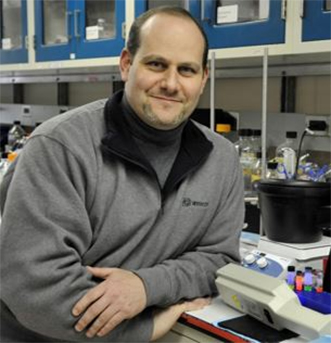
February 9, 2018
11.00am in IMS 20
Enhancing Enzymatic Activity with Nanoparticle Scaffolds – Towards Cell Free Biocatalysis
Igor L. Medintz
Center for Bio/Molecular Science and Engineering
U.S. Naval Research Laboratory
Washington D.C. U.S.A.
(Igor.medintz@nrl.navy.mil)
ABSTRACT
Enzymes and especially multienzyme pathways are of tremendous interest for the production of industrial chemicals and in the development of metabolic sensors. One primary focus of synthetic biology is to design enzymatic production capabilities in a “plug and play” format within cellular systems. Living cellular systems, however, can suffer from toxicity, competing pathways and sometimes an inability to mix enzymes from different species. Application of enzymes for industrial catalysis is often achieved by immobilization on a surface since this often provides stability and facilitates purification and reuse of the enzymes from the reaction mixture. Unfortunately, immobilization of enzymes on large planar surfaces often results in loss of enzymatic activity. We seek to create cell-free enzyme systems that can circumvent these issues in a “plug and play” format where enzymes are assembled on nanoparticle surfaces but still overcome diffusion and stability issues. We, and others, have demonstrated that immobilization of enzymes or substrate on nanoparticles often results in enhanced enzymatic activity relative to the free enzyme in solution. Mechanistic studies of this phenomena will be presented starting with substrate on nanoparticles and then progressing to the converse approach. Examples of multienzyme cascades assembled on nanoparticles that appear to access substrate channeling phenomena will also be presented. The challenges of characterizing and describing these complex organic/inorganic supramacromolecular systems will also be discussed in the context of further studies moving forward.
Host: Elena Dormidontova (elena@uconn.edu) and Mu-Ping Nieh (mu-ping.nieh@uconn.edu)